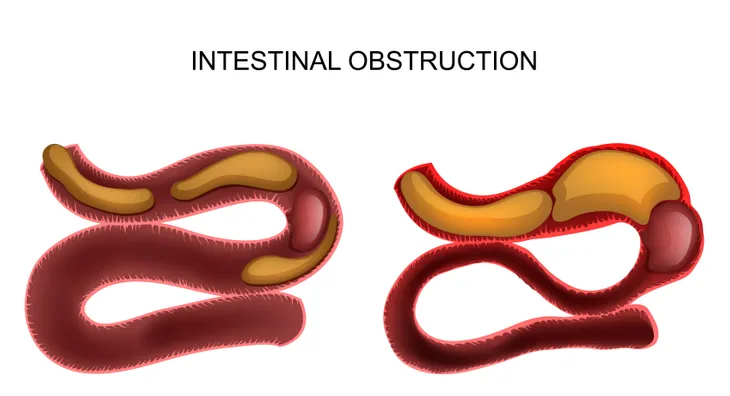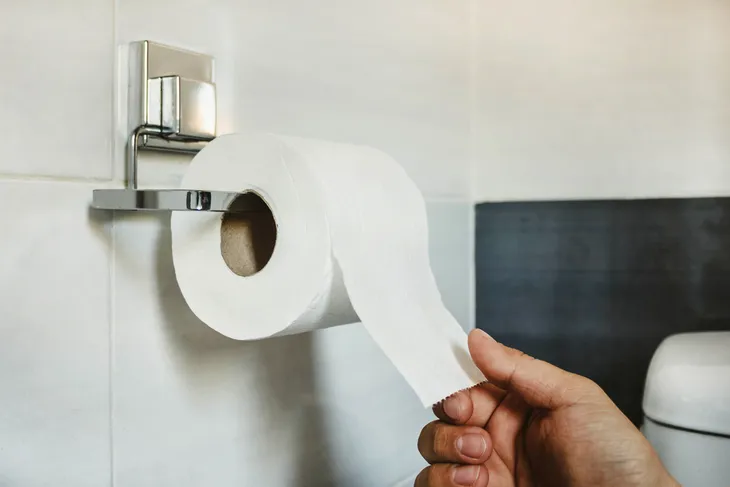Even just the thought of a bowel obstruction is unpleasant, let alone experiencing one! Not only is it uncomfortable, it can be a serious problem that needs immediate attention, so it’s important to be aware of any potential signs. A bowel obstruction occurs when something is blocking the bowels, either in the large or small intestine, says WebMD. It is sometimes also referred to as an intestinal obstruction.
Not surprisingly, when things come to a halt in the digestive system, it can cause serious or even life threatening complications. To keep people safe and better informed, here’s a look into all the signs a person may encounter while suffering from a bowel obstruction…
What is a Bowel Obstruction?
A bowel obstruction occurs when there is something blocking either the small or large intestine. This blockage makes it difficult for anything to pass through and can cause a buildup of food, gastric acids, gas, and fluids. As this continues, pressure builds which leads to a multitude of other symptoms (i.e., bloating, abdominal pain, etc) which we’ll get into later.
The most common type of blockage is called fecal impaction, says WebMD. “This is when a large, hard mass of poop gets stuck in your digestive tract and can’t get pushed out of the usual way.” When the bowel is blocked by something other than hard stool, it’s referred to as a bowel obstruction.
Medical News Today warns that a bowel obstruction can lead to serious complications as it can result in a rupture or split intestine. Also, whatever is behind the blockage can move into the abdominal cavity and spread bacteria.
Types of Bowel Obstructions
There are two main types of a bowel obstruction, says WebMD. It could be either a partial blockage or a complete blockage. The source notes that you could also have a pseudo-obstruction which is when a person has all the symptoms of a bowel obstruction, but there’s no actual blockage. When this happens, it’s typically related to gastrointestinal muscles or the nerves that control them.
Symptoms of Bowel Obstruction
Any symptoms associated with a bowel obstruction will depend on how severe the obstruction is. However, here’s a look into the most common symptoms associated with a bowel obstruction…
Abdominal Cramps
We’re listing this symptom first because it’s by far the most common. No matter how severe the obstruction is, pretty much everyone with any kind of bowel obstruction will experience some level of pain. It can feel like a dull ache or more similar to cramping. This pain is usually located around the belly button.
We all experience stomachaches here and there, and particularly if we’re feeling a little extra gassy. So this symptom on its own isn’t anything to worry about, however it’s a good idea to keep an eye on any abdominal discomfort that is associated with constipation to make sure it doesn’t continuously get worse over time. If you develop a fever, it’s time to contact a doctor.
Constipation
Constipation is another extremely common symptoms and will occur if the intestine is completely blocked. It’s important to note that infrequent bowel movements or even constipation on its own, isn’t a sign of a bowel obstruction. “A lot of people have nonspecific symptoms like abdominal pain, and they’re concerned about obstruction because they’re constipated,” says Richard A. Desi, a gastroenterologist at Mercy Medical Center in Baltimore when talking to Everyday Health. “Obstruction and constipation are two different things. Bowel obstruction is nothing chronic — there’s usually a very dramatic progression of symptoms.”
The general rule of thumb for diagnosing whether or not a person is constipated is by the number of stools they pass in a week. If a person passes less than three per week, they will likely be diagnosed as constipated. For the most part, constipation is due to diet, but in rare cases it can be due to an obstruction.
Unable to Pass Gas
Similar to constipation, the inability to pass gas can be quite painful and uncomfortable. While it may be a taboo topic to talk about at a dinner party, passing gas and flatulence in general is a very normal part of the human body. We should all be able to pass gas on a frequent basis, and if we can’t, it likely means there is a blockage whether it be a bowel obstruction or constipation.
Someone who is unable to pass gas will likely become extremely bloated with a hard stomach that might even be visibly distended. If you’re having difficulty passing gas and experiencing a number of other symptoms on this list, contact a doctor immediately.
Bloating
Bloating is super uncomfortable and most of us have probably experienced it at some point or another. The feeling of bloat often occurs after eating too much, a poor diet, or feeling constipated. It’s also a common symptom of a bowel obstruction. “Bloating is most commonly the result of excess gas trapped in the muscles of the digestive system,” writes Facty. “While usually benign, it can be extremely uncomfortable and sometimes painful to experience.”
In addition to feeling bloated, your stomach might feel very hard and swollen. It may also appear bloated from the outside by looking visibly distended. In addition to determining the reason behind what’s causing this bloat, the best remedy is to drink more water.
Nausea and Vomiting
Nausea and vomiting are typically early signs of a bowel obstruction. If you catch these symptoms early, you may be able to seek treatment before the condition gets any worse.
Nausea doesn’t always lead to vomiting, but is usually the precursor. Nausea can be a prolonged symptom or be very brief. When nausea leads to vomiting, it’s typically the sign of an obstruction in the small intestine. You’ll likely be throwing up food that isn’t digested and has nowhere else to go. When this happens, the amount bile will occur in large amounts. In extremely rare cases, you’ll experience fecal vomiting which can be extremely dangerous.
Feeling “Full”
This symptom is somewhat similar to bloating in the sense that you’ll likely feel extremely full and as if there just isn’t even an inch of more space left in the abdomen. You likely experience a similar feeling after eating a large meal and that’s normal. However, persistent fullness could be a sign that the digestive system isn’t functioning properly.
Nausea and vomiting can occasionally accompany this symptom. It can lead to weight loss because the person doesn’t feel like eating, as well as constipation and acid reflux, says Facty.
Fatigue and Malaise
Malaise is defined as a general feeling of discomfort or unease. This may be occurring as a result of other symptoms you’re experiencing which are not only letting you know that something may be wrong, but also causing a great deal of fatigue and weakness in your body. According to Facty, this will likely be one of the earlier symptoms associated with a bowel obstruction.
The weakness caused by fatigue and malaise will make most daily activities difficult or unattainable. You’ll lack the energy to carry on with your day or even get out of bed, but not be able to explain why. You’re likely experiencing this intense weakness due to a lack of nutrients whether that be from lack of appetite or because they are unable to be digested properly due to the obstruction in your bowel.
Decreased Appetite
Not surprisingly, anyone who’s feeling unwell due to a bowel obstruction is likely not going to have much of an appetite. Similar to many of the other symptoms on this list, a lack of appetite on its own isn’t a sign of a bowel obstruction, but will often accompany many of the others on this list. It’s largely due to the overwhelming bloat and nausea. A decreased appetite can lead to weight loss and malnutrition in extreme cases.
Diarrhea
You might be wondering why diarrhea is on this list if we’ve also included constipation. As we mentioned previously, there are different types of blockages that can occur in the bowel. With a partial blockage where some stool can get through, a person may experience diarrhea.
Diarrhea occurs when liquid stool is able to move around the obstruction and hard stool cannot form. To some medical professionals, this is referred to as “overflow diarrhea” and may occur until the blockage is cleared. This type of diarrhea can be extremely uncomfortable because it is persistent, and you’ll never feel like you’ve completely emptied your bowels.
Potential Complications
According to WebMD, most people with a bowel obstruction are older and may have other conditions therefore any complications could be life threatening. If you’ve been constipated for a period of time and are experiencing any of the other symptoms on this list, you should contact your doctor immediately. You’ll likely need to go to the hospital for treatment.
You should also seek assistance from a medical professional if you’re experiencing any kind of severe abdominal pain. Medical News Today says it’s especially important to seek a doctor if these symptoms occur after a surgery.















